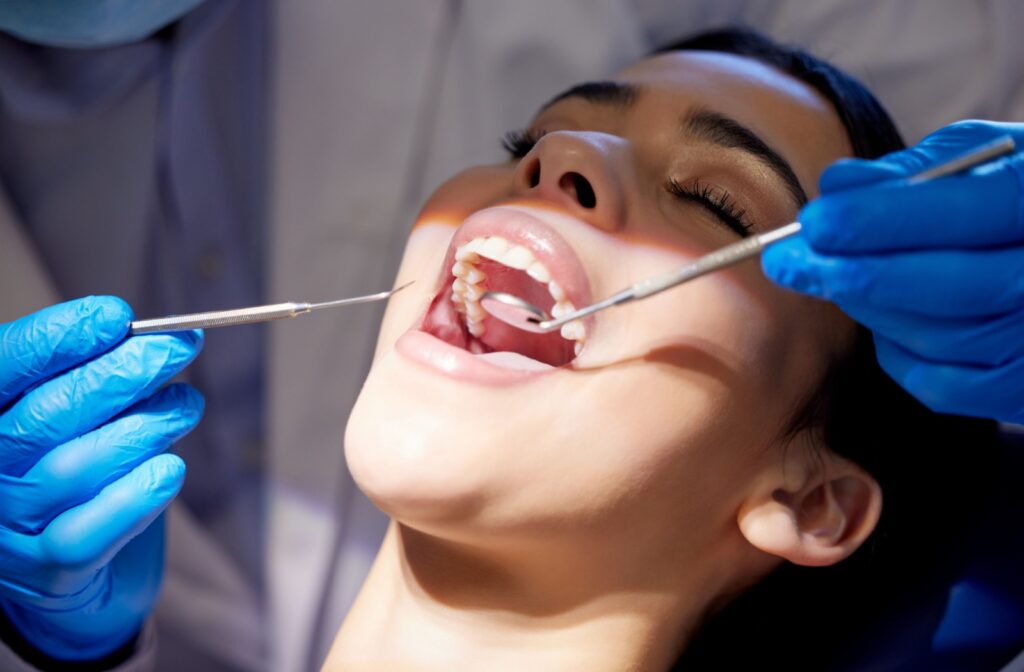Dental cleanings are an important part of keeping your teeth and gums healthy, but many people leave their appointment unsure of what to do next. One common question is whether it is okay to eat afterward. You can usually eat right after a dental cleaning, but if you received a fluoride treatment, wait at least 30 minutes.
Knowing what to expect after your visit and how to care for your teeth at home can help you protect the benefits of your cleaning and support long-term oral health.
Can You Eat Right After a Dental Cleaning?
Generally speaking, you can eat after a dental cleaning. However, there are a few exceptions that you should keep in mind, especially if you’ve had additional treatments during your appointment.
After a Fluoride Treatment
If your dentist applied a fluoride treatment during your cleaning, they will likely recommend waiting at least 30 minutes before eating or drinking. This wait time allows the fluoride to bond properly with your teeth, improving its ability to protect against cavities and sensitivity.
Following this recommendation helps you to get the maximum benefit from your fluoride treatment. And if your dentist gives specific guidelines, always prioritize their advice.
Why Is Professional Dental Cleaning Important?
Professional dental cleanings do much more than make your teeth shine. They’re an important part of preventing oral health issues and maintaining the long-term health of your teeth and gums.
Prevent Plaque & Tartar Buildup
No matter how diligent you are with brushing and flossing, there are areas of your mouth that regular at-home care simply can’t reach effectively. Plaque left on your teeth eventually hardens into tartar, which can only be removed during a professional cleaning.
By removing this buildup, dental cleanings help prevent tooth decay and gum disease, reducing your risk of more serious complications down the road.
Early Detection of Oral Health Issues
Dental cleanings give your dentist an opportunity to spot potential issues like cavities, gum disease, or early signs of oral infections. Addressing these problems early can save you from more invasive treatments later, making regular cleanings a critical part of preventive care.
Reduce Risk of Infection & Inflammation
Left untreated, bacteria from plaque and tartar can lead to inflammation in your gums, increasing the risk of periodontal disease. Regular cleanings help lower this risk, keeping your gums healthy and your smile bright.

What Happens During a Professional Teeth Cleaning?
Understanding what happens during a dental cleaning can make the experience less daunting and more predictable. Here’s what you can typically expect:
- Oral exam: Your dentist or hygienist starts by examining your teeth and gums, looking for signs of cavities, gum disease, or tartar buildup.
- Scaling and tartar removal: Using special tools, your hygienist will remove plaque and tartar, especially in hard-to-reach areas.
- Polishing: After the scaling, they will polish your teeth to remove surface stains and the sticky biofilm of bacteria.
- Rinsing: A thorough rinse clears away debris, leaving your teeth feeling clean and smooth.
- Fluoride treatment (if applicable): To provide an additional layer of protection, fluoride treatment is often applied to help combat sensitivity and fight cavities.
At Dentistry on Danforth, your comfort is our priority throughout the cleaning process, so don’t hesitate to speak up if you feel any discomfort.
Tips for Maintaining Your Cleaning Results
A professional cleaning provides a fresh start for your teeth, but maintaining those results requires consistent at-home care. Here are some tips to keep your smile clean and healthy between visits:
- Brush regularly: Use a soft-bristled toothbrush and fluoride toothpaste to brush twice a day.
- Floss daily: Flossing removes plaque and debris between teeth, areas your toothbrush can’t reach.
- Stay hydrated: Drinking plenty of water keeps your mouth hydrated and helps neutralize harmful acids.
- Avoid smoking: Smoking not only stains your teeth but also irritates your gums and increases your risk of gum disease.
- Eat a balanced diet: Limit sugary foods and beverages, opting instead for nutritious choices like fruits, vegetables, and dairy that support your oral health.
By incorporating these habits into your daily routine, you can extend the benefits of your dental cleaning and maintain your oral health long-term.
How Often Should You Schedule a Dental Cleaning?
The general recommendation for most adults is to visit the dentist for a professional cleaning every 6 months. However, depending on your oral health, your dentist might suggest more frequent cleanings, especially if you are prone to issues like cavities or gum disease.
By staying proactive with regular cleanings, your dentist can spot potential issues early and help you avoid costly treatments in the future. Regular care is key to maintaining a healthy, beautiful smile.
Take the Next Step Toward Healthy Teeth
Professional dental cleanings are a vital step in achieving and maintaining optimal oral health. They keep your teeth free of plaque and tartar, protect your gums from disease, and help you avoid more serious dental problems later.
If you’re due for a cleaning or have questions about fluoride treatments, request an appointment with Dentistry on Danforth today. Our team is ready to help you keep your smile as bright and healthy as possible!


